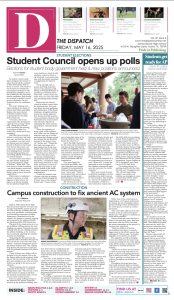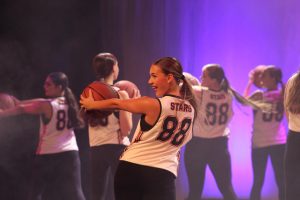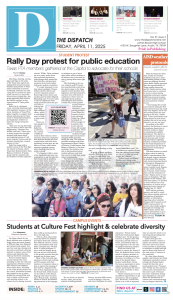We Dine Together
Student leaders host parties during lunch to promote inclusiveness throughout campus
December 30, 2018
Someone sits alone in the hallway. He hasn’t said one word to anybody at school all day, and no one has noticed. Or so he thinks. Now, that is all changing.
National Honor Society (NHS) sponsor Kelly Flickinger aims to change the culture at James Bowie High School, with her initiative known as We Dine Together.
“It’s really important to me for students to really feel connected with our community and just with each other,” Flickinger said. “We were just trying to come up with ways to try to change the culture of this gigantic school of almost 3000 students to really just make people feel like they wouldn’t make it throughout the day without at least talking to somebody. There should never be a day that a student goes through the day without talking to somebody in a personal way on a personal level.”
To NHS officer, senior Allison Yetter, We Dine Together works to benefit all students.
“The definition of We Dine Together is just a group of people looking to make a positive impact at Bowie,” Yetter said. “We are making sure that no student feels excluded or like they don’t belong, and not because we are forced to, but because I genuinely want to get to know these kids. We want to change the culture of Bowie for the better.”
The goal of the initiative is to shift the culture of campus, and inspire a more welcoming atmosphere. The NHS students’ role is to walk the hallways and invite everyone they see sitting alone to Flickinger’s classroom for pizza, cookies, and snacks.
“We Dine Together is bringing people together for food and fun,” senior Seth Werchan said. “It’s a ‘welcome’ sign above the door, that it doesn’t matter who you are, everybody is welcome to come and talk and enjoy their lunch.”
The reach of We Dine Together has extended to organizations outside of just NHS. These organizations include PALS, Silver Stars, and the softball team.
“Those have been the main organizations that have come to me and said, ‘hey we want to be a part of this,’” Flickinger said. “We’re trying to make sure that we have a community of people. That when people walk into Bowie, they just feel this culture change. That there’s this idea of family and just connectedness at some point and sometime.”
For Werchan, the motivation behind being involved is to push for inclusiveness on campus.
“I participate because I want Bowie to have an inclusive feel, that no matter who you are, somebody cares about you and is willing to hear what you’re thinking,” Werchan said. “With a school as big as Bowie, some kids may feel left out, and we’re trying to help with that problem.”
However, the initiative doesn’t come without its challenges.
“Some challenges are just initiating contact,” Werchan said. “It can be hard to go talk to someone you’ve never met before and prove your trust, but once you get past that, everybody enjoys it.”
For Flickinger, the conflicts lie mainly in the logistics.
“The most challenging part has been trying to set up a process that actually works for students to actually know when they’re coming, it’s just the mechanics,” Flickinger said. “Thank goodness it’s not the relationship piece. It’s like the students are taking care of that part.”
Acknowledging that some students don’t want to be approached is an essential part of the initiative. However, according to Flickinger, the goal is to make sure everyone feels they have a place.
“Obviously we want to give them their space to be able to work and study and stuff like that,” Flickinger said. “But this idea of nobody is by themselves. Everybody has a place. Students never get lost in the sea. I just don’t want that to ever happen. I want it to be this constant change of culture and community.”
For Yetter, the most gratifying part revolves around starting conversations with people she otherwise wouldn’t know.
“The most rewarding aspect is probably getting to meet new people,” Yetter said. “There are so many people at Bowie that I never would have met if I hadn’t decided to do We Dine Together. I think this will help the students because we are shaping their high school experience. We are sharing memories that they will be able to remember and cherish.”
Flickinger teaches advanced math classes such as AQR and AB Calculus, classes specific to seniors. To her, We Dine Together is a way to expand her reach to other students.
“The most rewarding is hearing the student stories,” Flickinger said. “Especially for me and teaching all seniors, so from a teacher perspective I’m getting to talk to the freshmen and hear the things that they’re struggling with right and all levels. To hear the students connect with each other and to see those relationships foster and grow from both the students perspective and from what I get to hear and see it’s just awesome for sure.”
In the future, Werchan hopes to see We Dine Together expand and relationships continue to build.
“I can see the future as being much larger, with many people bringing food and more people coming,” Werchan said. “This is a great opportunity to build relationships with new people, and it can grow as big as we want it to. We just need people to believe in what we’re doing and we can have a lot of fun and a lot of success.”






